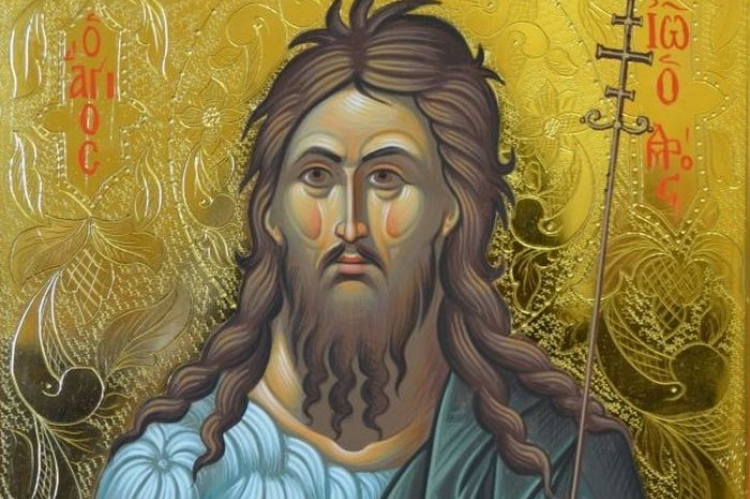Synaxis of John the Holy Glorious Prophet, Baptist, & Forerunner (7 January)


Τoday we celebrate the Synaxis in honour of the most sacred Forerunner, since he ministered at the Mystery of the Divine Baptism of our Lord Jesus Christ.
Rest from labour. Fish allowed.
In the Orthodox Church it is customary, on the day following the Great Feasts of the Lord and the Mother of God, to remember those saints who participated directly in the sacred event. So, on the day following the Theophany of the Lord, the Church honors the one who participated directly in the Baptism of Christ, placing his own hand upon the head of the Savior.
Saint John, the holy Forerunner and Baptist of the Lord, whom the Lord called the greatest of the prophets, concludes the history of the Old Testament and opens the era of the New Testament. The holy Prophet John bore witness to the Only-Begotten Son of God, incarnate in the flesh. Saint John was accounted worthy to baptize Him in the waters of the Jordan, and he was a witness of the Theophany of the Most Holy Trinity on the day of the Savior’s Baptism.
The holy Prophet John, the son of the Priest Zachariah and Righteous Elizabeth, was related to the Lord on His mother’s side. The holy Forerunner, John, was born six months before Christ. The Archangel Gabriel announced his birth in the Temple at Jerusalem, revealing to Zachariah that a son was to be born to him.
Through the prayers offered beforehand, the child was filled with the Holy Spirit. Saint John prepared himself in the wilds of the desert for his great service by a strict life, by fasting, prayer and sympathy for the fate of God’s people.
At the age of thirty, he came forth preaching repentance. He appeared on the banks of the Jordan, to prepare the people by his preaching to accept the Savior of the world. In church hymnology, Saint John is called a “bright morning star,” whose gleaming outshone the brilliance of all the other stars, announcing the coming dawn of the day of grace, illumined with the light of the spiritual Sun, our Lord Jesus Christ.


Having baptized the sinless Lamb of God, Saint John soon died a martyr’s death, beheaded by the sword on orders of King Herod at the request of his daughter Salome. (On Saint John the Baptist, see Mt.3:1-16, 11:1-19, 14:1-12; Mark 1:2-8, 6:14-29; Luke 1:5-25, 39-80, 3:1-20, 7:18-35, 9:7-9; John 1:19-34, 3:22-26).
Because John’s main role in his life was played out on the day of the Theophany (Epiphany), the Church has from earliest times dedicated the day following Theophany to his memory. An incident with the hand of the Forerunner is also linked to this feast. The Evangelist Luke desired to remove the body of John from Sebaste, where the great prophet was beheaded by Herod, to Antioch, his place of birth. He succeeded, though, in acquiring and translating only one hand, which was preserved in Antioch until the tenth century. After this it was transferred to Constantinople, where it disappeared during the time of the Turks.
Feasts of St. John are celebrated several times throughout the year, but this day, January 7, has the most Svečara.*) Among the Gospel personalities who surround the Savior, John the Baptist occupies a totally unique place by the manner of his entry into the world, and by the manner of his life in this world; by his role in baptizing people for repentance; by his baptizing the Messiah; and, finally, by his tragic departure from this life. He was of such moral purity that, in truth, he could be called an angel–as Holy Scripture calls him–rather than a mortal man. St. John especially differs from all other prophets in that he had that privilege of being able, with his hand, to show the world Him about Whom he prophesied.
It is said that every year on the feast of the saint, the bishop brought the hand of St. John before the people. Sometimes the hand appeared open and other times the hand appeared clenched. In the first case it signified a fruitful and bountiful year, and in the second case it meant a year of unfruitfulness and famine.
Apolytikion of Synaxis of John the Forerunner
Second Tone
The memory of the just is celebrated with hymns of praise, but the Lord’s testimony is sufficient for thee, O Forerunner; for thou hast proved to be truly even more venerable than the Prophets, since thou was granted to baptize in the running waters Him Whom they proclaimed. Wherefore, having contested for the truth, thou didst rejoice to announce the good tidings even to those in Hades: that God hath appeared in the flesh, taking away the sin of the world and granting us great mercy.
Kontakion of Synaxis of John the Forerunner
Plagal of the First Tone
The Jordan accepted Your presence in the flesh and reversed its course in fear. John, fulfilling the spiritual ministry, fell back in awe. The ranks of Angels, seeing You in the flesh, baptized in the river, were amazed, and all who were in darkness were filled with light, praising You who appeared and enlightened all.
Source: oca.org / goarch.org / westserbdio.org




